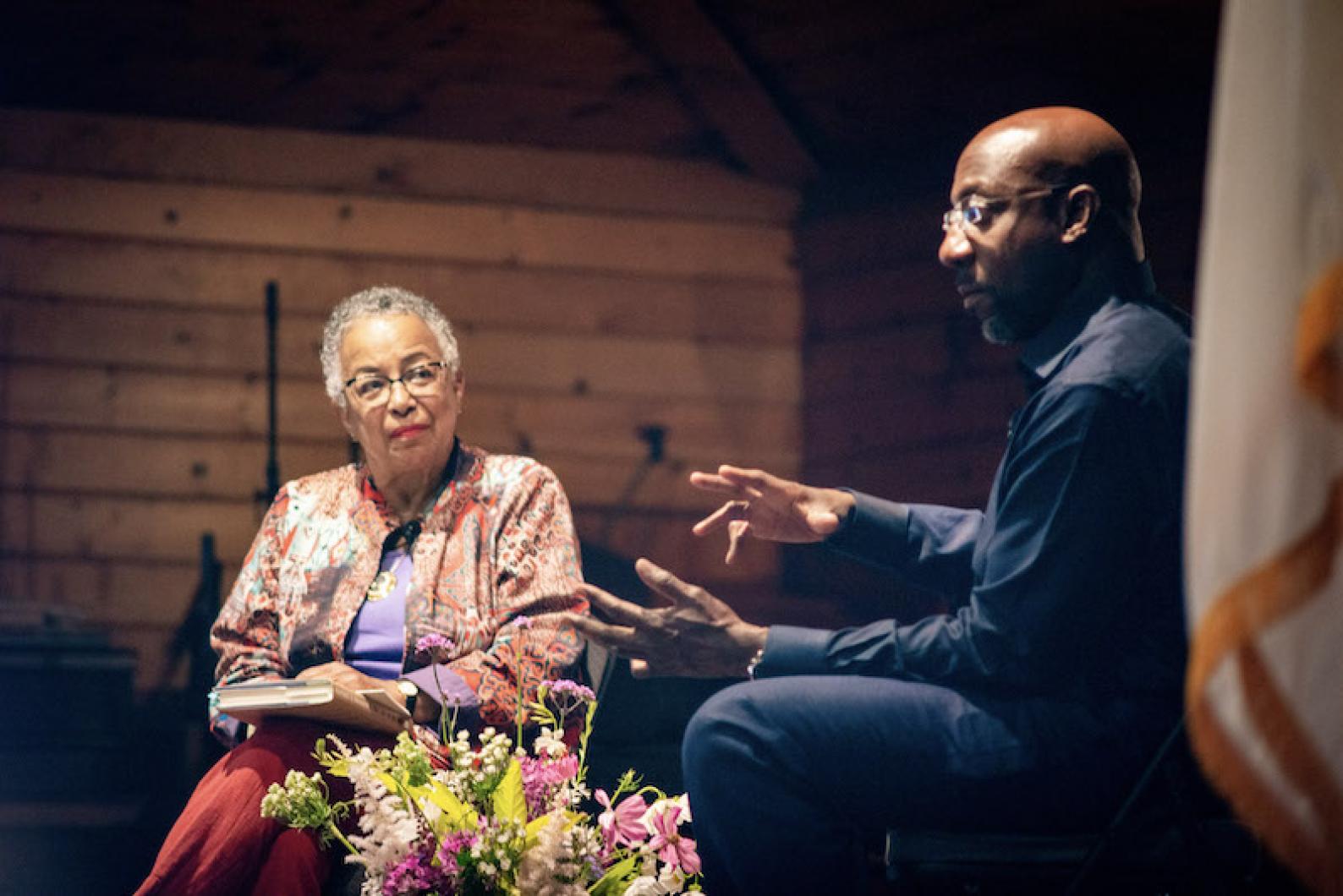Raphael Warnock may be the first black U.S. Senator from Georgia, but he does not consider himself a politician.
“I’m not in love with politics, I’m in love with change,” Mr. Warnock said. “I got involved in something as messy as politics with a hope that somehow the things that I’ve worked on my entire life, I might be able to work on in this arena.”
It was that spirit of change which coursed through the senator’s talk on the opening night of the Martha’s Vineyard Author Series, which runs through the middle of August. In front of a sold out crowd on Thursday night at the Chilmark Community Center, Mr. Warnock spoke about both his religious faith and his faith in American democracy.
“Democracy, for me, is the political enactment of a spiritual idea,” Mr. Warnock said. “The notion that all of us have within us a spark of the divine, therefore we ought to have a voice in the direction of our country and our destiny.”
Mr. Warnock sat in conversation with Barbara Phillips, a lawyer and advocate for civil rights. The two were there to talk about A Way Out of No Way, Mr. Warnock’s memoir which was published earlier this month. Before the talk began, author series founder Suellen Lazarus welcomed the crowd and introduced the pair.
“The last time we had an author series here, in this room, was in 2018,” Ms. Lazarus said. “Four years later we get to open with Senator Warnock.”
During the conversation, Mr. Warnock talked about his journey from growing up in public housing to becoming a pastor to running for office. He wove in lessons from the Bible with lessons from American history to share wisdom about where the country is today. Oftentimes Mr. Warnock stopped short of divulging everything about himself to not give away too much of the book.
“I don’t want to tell you, you’ve got to read the book,” he said half-jokingly at one point.
For over 15 years Mr. Warnock has been the pastor at Ebenezer Baptist Church in Atlanta, where Martin Luther King Jr. once held the same position. Mr. Warnock makes the trip from Washington, DC to Atlanta each Sunday to preach, and said his faith has long formed the basis for engaging in the political and social process.
“The spiritual has to meet the practical,” he said. “All the great religious traditions get us engaged in the world.”
Georgia was represented in the Senate by Herman Talmadge and Richard B. Russell, two segregationists, when Mr. Warnock was born in 1969. Mr. Warnock winning his seat along with Jon Ossoff, the state’s first Jewish senator, is a sign of American progress, he said.
“Talmadge said ‘we love the Negro in his place, and his place is at the back door,’” Mr. Warnock said. “Well, I now sit in his seat.”
But if Mr. Warnock and Mr. Ossoff’s election represented the expansion of democracy, the events which followed represent its contraction, he said. The two men officially won election on Jan. 5, one day before the storming of the United States Capitol. Those two moments, and what they represent, are meaningful to the story of our country, Mr. Warnock said.
“January 6th is part of who we are, and have always been, but guess what, so is January 5th,” he said. “We’ve got to decide which America we’re going to be.”
Mr. Warnock pointed to the late civil rights leader John Lewis as an example of why it is important not to give in to those periods of contraction. Mr. Lewis and a legion of activists crossed the Edmund Pettus Bridge fighting for black people to have the right to vote in Alabama in 1965 knowing they could be beaten and killed. But they did it because the fight to lift the country to its promise of freedom and equality for all was that important, he said.
“We talk about the movement as if those victories were inevitable; they were quite improbable,” Mr. Warnock said. “And yet people kept the faith and kept pushing and they kept fighting. So who are we to give up at a moment like this?”
Senator Raphael Warnock will deliver this Sunday’s sermon at the Tabernacle in the Oak Buffs Camp Ground, in a combined service of the Camp Meeting Association, the First Congregational Church of West Tisbury and Union Chapel. Services begin Sunday at 9:30 a.m.






Comments
Comment policy »